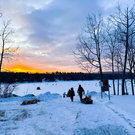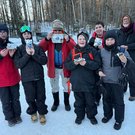Discourage black bears by being vigilant about food
The summer outdoor recreation season is well underway and the New York State Department of Environmental Conservation is advising homeowners and tourists about ways to discourage bears from becoming a nuisance.
Black bears will take advantage of almost any readily available food source. Once bears learn about human food sources, it is not easy to recondition them to the wild and this can lead to conflicts between bears and people. It is against the law to feed bear, deer, and moose.
During midsummer and dry conditions, the black bear’s natural foods are much more difficult to find. DEC Wildlife and Law Enforcement staff respond with technical advice as quickly as possible but local residents and visitors are responsible for preventing bears from gaining access to food items such as bird food, garbage, and unattended coolers.
Black bears are generally timid and avoid people but, if allowed access to human foods, chronic problems can develop. It is against DEC regulations to directly or indirectly feed bears, and people who feed bears, intentionally or otherwise, are doing bears a great disservice.
Once a bear learns to get food from people, it can be difficult to change the animal's behavior. Bears are vulnerable to motor-vehicle collisions in populated areas. In addition, if behaviors reach certain thresholds, in order to protect public safety, DEC biologists may determine it necessary to euthanize an offending bear. It is always a last resort to take a bear.
Once a bear becomes a problem, people often request that the bear be moved. Bear relocations can work if the bear isn't solely feeding from human sources.
Relocating bears is extremely time consuming and does not solve the overriding problem if people are feeding them. Bears are extremely mobile and have an excellent sense of smell and homing abilities and may return to the original capture site or start a new problem where there was none.
If food attractants are not managed correctly new bears will be quickly attracted and the problem will persist. The key to preventing or solving most problems between bears and people is to eliminate the artificial food sources provided by people.
New Yorkers can help by following these guidelines:
— When camping, keep food out of sight and secured in a vehicle if one is available. Hang food and garbage from a tree, out of reach (eight feet or higher). Also, keep picnic tables, utensils, fireplaces and the area around them clean. Do not leave coolers unattended;
— Do not feed birds through the summer. Birds don't need supplemental food this time of year when their natural food is most abundant;
— Dispose of garbage as frequently as possible. Store it in clean, secure containers (top-latched, tied, or chained). Double-bag meat scraps in a zip-lock bag. Use ammonia-soaked rags inside the garbage bag before closing. Tie off a garbage bag before placing it in a container;
— Do not leave dirty diapers or diaper pails outside;
— If you live in an area frequented by bears, periodically disinfect or scrub garbage cans with Lysol, ammonia, or bleach and water, and store your garbage cans in a secure place such as a garage, cellar, or a bear-resistant container, instead of a porch if possible;
— If your garbage is picked up at the curb, put the garbage out just before the scheduled pickup or place it in a roadside bear-resistant container. Don't put garbage out the night before pick-up at the curb;
— Feed pets and store foods indoors. If you must feed outdoors, give only enough food for one feeding, and take in all uneaten food and dishes before dark;
— Remember that the smell of cooked foods may attract wandering bears closer to your house. Clean up after your picnic or barbecue. Keep barbecue grills as clean as possible and, after they cool down, store them inside. Do not overlook cleaning the grease trap;
— Don't add meat scraps, bones, or melon rinds to your compost pile; and
— Don't leave food visible for bears to see in through windows. Close blinds if necessary.
It's against the law to feed a bear. If you witness bear-feeding activity, report the incident to DEC Law Enforcement immediately.
Residents and tourists alike are asked to respect bears as wild animals so everyone can enjoy them with a minimum of problems. For more information about bears and reducing human-bear conflicts, visit DEC’s website at http://www.dec.ny.gov/animals/6995.html.


